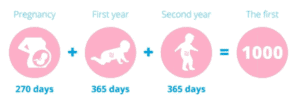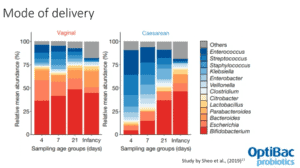The importance of your first 1,000 days

Our first 1,000 days have a massive impact on our health for the rest of our life. From conception to two years of age is a crucial developmental window – a time when one small area of our body can dictate whether we become ill later and how. Important research now shows that if we paid more attention to this key area we could dramatically decrease the amount of chronic disease throughout the world, which the World Health Organisation now believes is responsible for 60% of deaths

Want to read the full article? Sign up here to The Daily Dose
[swpm_protected for=”4″ format_protected_msg=”1”]
The old saying that you have a ‘gut feeling’ about something turns out to be more than just a phrase. Our gut holds the key to how healthy we are, and how your gut is feeling in our first days of life map out our future prospects.
The bacteria throughout our body – our microbiome, which mainly lives in the gut – has been attracting a great deal of interest over the past few years. This internal eco-system, with its delicate balance of beneficial bacteria protecting us from illness vs harmful bacteria (or pathogens) triggering disease, is now known to be crucial in maintaining good health. What is increasingly becoming evident too is that during our first 1,000 days the health of this eco-system also sets the foundation for our health for the rest of our lives.
By protecting and supporting the health of our microbiome during this period it is believed that we could lessen the incidence of chronic diseases such as asthma, allergies, obesity and type 2 diabetes.
Poor microbiome health in your first 1,000 days could affect both how long you live and how well you live
Conception
The balance of the bacteria in the vagina has recently been proved to have an effect on fertility. Women with bacterial vaginitis (BV) have an increased risk of fertility issues because, it is thought, the infection inhibits sperm motility due to inflammation or a change in body pH. As a consequence some fertility clinics are now testing for BV before they will start IVF.
One study has also shown that taking probiotics can improve semen quality.
Pregnancy
During a healthy pregnancy the vaginal microbiome changes dramatically, with higher levels of lactobacillus strains to protect the foetus. If this fails to happen this can have a serious effect on the progress of the pregnancy:
- High levels of the harmful bacteria gardnerella spp and candida albicans in the vagina are associated with pre-term birth.
- Around 25% of preterm births are born to mother who have an infection in their amniotic cavity.
- Women with gum infection and gingivitis are also at a higher risk of pre-term birth.
- Women who take antibiotics in pregnancy have higher levels of staphyloccocus and E-coli in their vagina. If their baby is born vaginally they will be exposed to these harmful microbes, both of which are associated with allergies, eczema and asthma.
As 34% of women in the UK take antibiotics (usually for UTIs) in pregnancy this could explain why more children are suffering from allergies, eczema and asthma
 Birth
Birth
The way we are born dramatically affects the bacteria in our gut, with babies born vaginally significantly better off than Caesarian-born children. If you have a natural birth you benefit from your mother’s protective bacteria, whereas those born by Caesarian have substantially more pathogens in their microbiome.
The chart shows the balance of beneficial bacteria (in red/orange) vs harmful (in blues). If a baby is born by C-section birth he/she is exposed to hospital microbes, such as clostridium, whereas when a baby is born vaginally he/she is coated and swallows bacteria from the mother’s vagina and gut.
- The levels of beneficial bifidobacteria (dark red in the chart) are way higher in naturally born babies.
- During the first month harmful E-coli decreases in vaginally born babies whereas it increases in C-section children.
- Bacteroides (orange in the chart), which are essential for immune system development, are at a constant level from birth in vaginally born babies whereas they only begin to kick in at one month old in Caesarian babies.
- The pathogens enterococcus, streptococcus, staphylococcus, klebsiella (in blue) are much higher in the C-section babies, particularly in the first three weeks.
- Bifidoobacteria (dark red) – most particularly the strains B bifidum, infantis, breve and longum – predominate in babies born vaginally whereas they are virtually non-existent in those born by Caesarian. Bifidobacteria are especially important in the initial priming of our immune system, vital for maintaining a healthy gut and preventing opportunistic pathogens from entering, plus they are rich in lactase enzymes that are essential for breaking down breast milk.
The bottom line is that if you miss out on having the right microbes at the right time it’s likely to be the cause of many underlying health problems later in life. This is why Caesarian-born babies are at higher risk of:
weight management problems, gut issues including inflammatory bowel disease, Crohn’s and caeliac ulcerative colitis, diabetes (type 1 and 2) and asthma
As Caesarian sections have risen in the UK from 1 in 5 births in 2000 to 1 in 4 in 2015 it is likely that this is why weight management problems, gut issues, diabetes (type 1 and 2) and asthma conditions are on the rise
First few months
The World Health Organization recommends breastfeeding for the first six months, and an important benefit in this is again to do with the microbiome.
Breast milk is nutrient dense and contains a plethora of goodness, including the mother’s microbes, important immune substances such as antibodies, and human milk oligosaccharides (HMOs). These are prebiotics – the bacteria that ‘feed’ probiotics by creating the right conditions for them to thrive – which have specifically evolved to feed the four bifidobacteria that are best to nurture a healthy baby’s microbiome.
While formula milk does contains prebiotics (FOS and GOS), which do also feed bifidobacteria, they are not as selective and will encourage a wider range of bacteria to colonise the gut.
After weaning
Once babies start to eat solids they develop an increased diversity of microbes in their gut which they need to cope with the wider diversity of food they’re digesting and new experiences to which they are exposed. Environmental factors that have a positive influence on the microbiome by stimulating it are:
- crawling
- pets – studies show that having a dog from an early age is protective against asthma, allergies and type 1 diabetes
- farm animals
- dummies – one study showed that babies whose parents cleaned their dummy by sucking on it themselves before putting it back into their mouth were less likely to have asthma or eczema at 18 months
- nursery/day care
Factors that have a detrimental effect on the microbiome are:
- antibiotics – the ill-effects of taking antibiotics at this early stage can be lifelong. Studies have shown that antibiotics taken from birth to two years increase the risk of developing asthma, eczema, allergies, weight gain and IBD.
- smoking
The UK has one of the highest prevalences of asthma, rhinitis and eczema in the world: 1 in 5 children has eczema at some time; three children in every classroom have asthma. And children who have a chronic illness like this early in life have a bigger predisposition to a chronic disease later in life. It is now believed, however, that better microbiome health could reverse these statistics
Our advice? Take probiotics when you are trying to conceive and throughout the third trimester of pregnancy and give your baby probiotics during his/her early months. The evidence suggests you will have an increased likelihood of a full-term birth and a child who is less susceptible to chronic illness. Choose probiotics tailored for pregnancy and for babies such as Optibac For Pregnant Women and For Your Baby: for more information click here.
[/swpm_protected]
